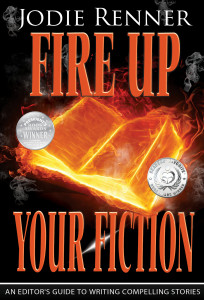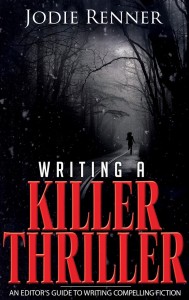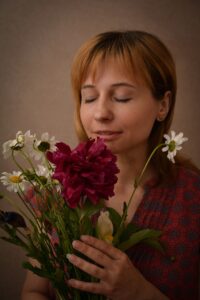 by Jodie Renner, editor, author, speaker
by Jodie Renner, editor, author, speaker
To set the mood of a scene in your story, bring the characters to life, and engage readers in their world and their plight, it’s critical to choose just the right nuance of meaning to fit the character, action, and situation. And verbs are the heavyweights in your sentences, so pay particular attention to them. Especially avoid the very common but tired, overused verbs like walked, ran, and looked. Instead, find a synonym that shows how that action is taking place.
Say you’ve got a character going from one place to another. How are they moving, exactly, and why? Convey their physical and emotional state at that moment by using a strong, precise, evocative verb. Readers will envision the character and situation much differently, depending on whether you show them strolling or striding or skipping or shuffling or sauntering or slinking or strutting or sashaying or slogging along, just to name a few “s” movement verbs, for example.
For help in zeroing in on the very best word to convey the tone and mood you’re after, it’s a good idea to use both a thesaurus and a dictionary (either online or print). Use the thesaurus to find a wide range of possibilities, then if you’re not 100% sure of the meaning, check with the dictionary to avoid embarrassing slip-ups.
But avoid choosing words your readers will need to look up in a dictionary.
Just make sure to choose a word that really nails the meaning you’re looking for, not one that will impress your readers with your literary prowess. Choosing obscure words that just draw attention to themselves is a sure way to distract readers from your story and annoy them. So read your story out loud later to make sure the words you’ve chosen sound natural and are words your characters would actually say or think in the given situation. (And remember that narration is really the viewpoint character’s thoughts and observations!)
Example from my editing: She heard a stridulous sound coming from the basement.
I’ve never heard the word “stridulous” before, so it conjures up no image or meaning whatsoever to me. That’s the danger for a lot of your readers, too – no image, no impact. And a mild irritation at having to look a word up in the dictionary if they want to know what it means.
If you’d like to introduce some interesting words your readers might not know, it’s best to use them in context, so readers can guess at the meaning.
Choose words that enhance the tone, mood, and voice of your scene.
Find vivid verbs
Verbs are especially important, as there are so many variations in the way someone can move or speak or eat or whatever, depending on their personality, mood, age, gender, size, background, health, fitness level, and of course the circumstances. So it’s worth the effort to find just the right verb that nails the action and makes sense in the context of the scene. A verb that doesn’t quite fit can be jarring and turn a reader off, whereas finding a stronger, more specific verb can really strengthen a scene.
Words for “walked”:
I’ve compiled a handy list of synonyms for “walked” to fit various situations and characters:
– Drunk, drugged, wounded, ill: lurched, staggered, wobbled, shuffled, shambled
– Urgent, purposeful, concerned, stressed: strode, paced, treaded, moved, went, advanced, proceeded, marched, stepped
– Relaxed, wandering: strolled, sauntered, ambled, wandered, roamed, roved, meandered, rambled, traipsed
– Tired: trudged, plodded, slogged, clopped, shuffled, tramped
– Rough terrain, hiking: marched, trooped, tramped, hiked
– Sneaking, stealth: sidled, slinked, minced, tiptoed, tread softly
– Showing off: strutted, paraded, sashayed
– Other walking situations: waddled, galumphed (moved with a clumsy, heavy tread), shambled, wended, tiptoed
So in general, it’s best to avoid plain vanilla verbs like “walked” or “went” if you can find a more specific word to evoke just the kind of movement you’re trying to describe.
But don’t grab that synonym too quickly! Watch out for show-offy or silly words.
After you’ve found a list of interesting synonyms, choose carefully which one to use for the situation, as well as the overall tone of your book. For example, for “walk,” don’t go to extremes by choosing little-known, pretentious words like “ambulate” and “perambulate” and “peregrinate” (!), or overly colloquial, slang, or regional expressions like “go by shank’s mare” and “hoof it.”
And beware of words that just don’t fit that situation.
Also, some synonyms are too specific for general use, so they can be jarring if used in the wrong situations. I had a few author clients who seemed to like to use “shuffled” for ordinary, healthy people walking around. To me, “shuffled” conjures up images of a patient moving down the hallway of a hospital, pushing their IV, or an old person moving around their kitchen in their slippers. Don’t have your cop or PI or CEO shuffling! Unless they’re sick or exhausted – or half-asleep.
Similarly, I had a client years ago who was writing about wartime, and where he meant to have soldiers and officers “striding” across a room or grounds or battlefield, he had them “strutting.” To me, you wouldn’t say “he strutted” unless it was someone full of himself or showing off. It’s definitely not an alternate word for “walked with purpose” as is “he strode.”
Or, disguised from another novel I edited:
Joe stood up, shocked and numb, after his boss delivered the tragic news about the death of his friend. He dreaded his visit to Paul’s widow. He sauntered back to his office, his mind spinning.
The verb “sauntered” is way too relaxed and casual a word for the situation. The guy’s just been told his friend is dead. Maybe “found his way” or even “stumbled” back to his office.
For similar lists for the verbs “ran” and “looked,” as well as lots of other tips for writing compelling fiction, check out my award-winning writing guide, Fire up Your Fiction.
Here are two recent quotes from two different contest judges about Fire up Your Fiction:
“This should be on the booklist for Master’s Programs in Writing for Publication.” ~ Writer’s Digest Judge
“FIRE UP YOUR FICTION is the Strunk and White for writers who want to be not just mere storytellers but master story-compellers.” ~ Judge, IndieReader Discovery Awards
 Jodie Renner is a freelance fiction editor and the award-winning author of three craft-of-writing guides in her series An Editor’s Guide to Writing Compelling Fiction: Captivate Your Readers, Fire up Your Fiction, and Writing a Killer Thriller. She has also published two clickable time-saving e-resources to date: Quick Clicks: Spelling List and Quick Clicks: Word Usage. You can find Jodie at www.JodieRenner.com, www.JodieRennerEditing.com, her blog, http://jodierennerediting.blogspot.com/, and on Facebook, Twitter, and Google+.
Jodie Renner is a freelance fiction editor and the award-winning author of three craft-of-writing guides in her series An Editor’s Guide to Writing Compelling Fiction: Captivate Your Readers, Fire up Your Fiction, and Writing a Killer Thriller. She has also published two clickable time-saving e-resources to date: Quick Clicks: Spelling List and Quick Clicks: Word Usage. You can find Jodie at www.JodieRenner.com, www.JodieRennerEditing.com, her blog, http://jodierennerediting.blogspot.com/, and on Facebook, Twitter, and Google+.










